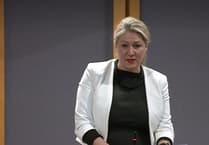MONMOUTHSHIRE County Council is “lobbying hard” for a share of a £25m windfall after receiving a below inflation increase in its funding from the Welsh Government.
The Welsh Government increased funding for local government by 3.1 per cent but said inflation had shrunk the value of its budget by nearly £1 billion since it was announced two years previously by the Westminster Government and it was prioritising the NHS and transport in the upcoming year.
Among the councils to lose out were Monmouthshire which has only been awarded a 2.3 per cent rise, which is a real terms cut.
However since the Welsh Government set its draft budget additional cash for local government in England, where a number of councils have either declared bankruptcy or stated it likely, has been announced by the UK Government which released a further £500m for social care.
That has resulted in additional £25m for the Welsh Government to spend and Cllr Ben Callard, the cabinet member for finance at Monmouthshire County Council, said it would like to see that handed to local government.
Cllr Callard said: “I’ve expressed my disappointment with the settlement. The average is 3.1 per cent. The changes in the settlement are driven by population changes, ours is not increasing as much as others, had it been we would have got more funding. It’s that simple.”
But the Llanfoist and Govilon member said he was “keen to press” on the Welsh Government rural councils, like Monmouthshire with older populations, have additional cost of delivering services due to the distances they have to cover.
He said: “We are lobbying hard for that extra money to come through to local authorities we are lobbying to try to maximise Monmouthshire’s benefit and a funding floor is one option.”
Cllr Callard said an increase in funding to three per cent would provide Monmouthshire with an extra £800,000 but reminded councillors its budget gap for the upcoming year is £21.9m. Other councils have also reported similar shortfalls between demand on services, rising costs and income.
“It would really help us but as pressure on services is about £20m it is a sticking plaster rather than a solution,” said Cllr Callard.
As well as cuts and savings of £8.4m to try and reduce the shortfall Monmouthshire is proposing a council tax increase of 7.5 per cent which works out at £117.35 extra for a band D house or £9.78 a month.
“Our council tax bill for a band D property the increase is about the middle of the pack across Wales and provides £5.4m. It is really providing a lot for those valuable services.”
He added there is a lot the council is “not doing” in its budget as it isn’t planning on closing leisure centres or making changes to the frequency of waste collections and is keeping its local hub offices open.
“This additional income from council tax is allowing us to do that,” said Cllr Callard who added there is reduction scheme and support for those who would struggle to pay.
Social care and health, at £67.8m accounts for the largest share of the council’s budget, followed by children and young people, which includes education, at £64m. Together they take up 66 per cent of its spending with Cllr Callard saying that leaves the reminder of the budget to pay for service, people typically associate with their local council such as highways, waste collections and leisure centres.
He said he hopes the Welsh Government will announce how it will spend the additional £25m before the council finishes its budget process in March.
The council is consulting on its budget until February 15.
Welsh councils were told how much money they would be receiving for 2024/25 at the end of December and are now preparing their budgets for the upcoming financial year which they must pass by March.
The Welsh Government increased funding for local government by 3.1 per cent but said inflation had shrunk the value of its budget by nearly £1 billion since it was announced two years previously by the Westminster Government and it was prioritising the NHS and transport in the upcoming year.
Among the councils to lose out were Monmouthshire which has only been awarded a 2.3 per cent rise, which is a real terms cut.
However since the Welsh Government set its draft budget additional cash for local government in England, where a number of councils have either declared bankruptcy or stated it likely, has been announced by the UK Government which released a further £500m for social care.
That has resulted in additional £25m for the Welsh Government to spend and Cllr Ben Callard, the cabinet member for finance at Monmouthshire County Council, said it would like to see that handed to local government.
The Labour councillor was questioned about the windfall by Conservative councillor for Shirenewton, Louise Brown, who said: “Plaid Cymru has argued that £25m should be given to rural councils to increase the (funding) floor from two to three per cent.”
Cllr Callard said: “I’ve expressed my disappointment with the settlement. The average is 3.1 per cent. The changes in the settlement are driven by population changes, ours is not increasing as much as others, had it been we would have got more funding. It’s that simple.”
But the Llanfoist and Govilon member said he was “keen to press” on the Welsh Government rural councils, like Monmouthshire with older populations, have additional cost of delivering services due to the distances they have to cover.
He said: “We are lobbying hard for that extra money to come through to local authorities we are lobbying to try to maximise Monmouthshire’s benefit and a funding floor is one option.”
Cllr Callard said an increase in funding to three per cent would provide Monmuthshire with an extra £800,000 but reminded councillors its budget gap for the upcoming year is £21.9m. Other councils have also reported similar shortfalls between demand on services, rising costs and income.
“It would really help us but as pressure on services is about £20m it is a sticking plaster rather than a solution,” said Cllr Callard.
As well as cuts and savings of £8.4m to try and reduce the shortfall Monmouthshire is proposing a council tax increase of 7.5 per cent which works out at £117.35 extra for a band D house or £9.78 a month.
“Our council tax bill for a band D property the increase is about the middle of the pack across Wales and provides £5.4m. It is really providing a lot for those valuable services.”
He added there is a lot the council is “not doing” in its budget as it isn’t planning on closing leisure centres or making changes to the frequency of waste collections and is keeping its local hub offices open.
“This additional income from council tax is allowing us to do that,” said Cllr Callard who added there is reduction scheme and support for those who would struggle to pay.
Social care and health, at £67.8m accounts for the largest share of the council’s budget, followed by children and young people, which includes education, at £64m. Together they take up 66 per cent of its spending with Cllr Callard saying that leaves the reminder of the budget to pay for service, people typically associate with their local council such as highways, waste collections and leisure centres.
He said he hopes the Welsh Government will announce how it will spend the additional £25m before the council finishes its budget process in March.
The council is consulting on its budget until February 15.





Comments
This article has no comments yet. Be the first to leave a comment.